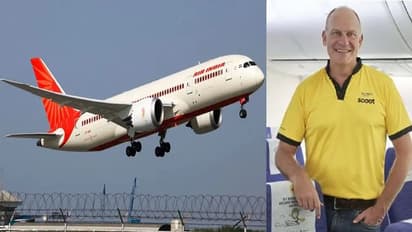DGCA meets Air India CEO after AI171 crash, urges better safety and service standards

Synopsis
Following the deadly crash of flight AI171, the DGCA met Air India’s top brass to flag serious safety, maintenance, and passenger service concerns. Seven international flights were cancelled on Tuesday, six involving Dreamliners.
India’s aviation regulator, the Directorate General of Civil Aviation (DGCA), on Tuesday held a crucial meeting with Air India CEO Campbell Wilson and top executives. The meeting took place days after the tragic crash of flight AI171 claimed over 270 lives near Gujarat's Ahmedabad. The meeting marked the first official dialogue between the regulator and the airline following the disaster.
The DGCA has asked the Tata Group-owned airline to urgently strengthen aircraft safety, streamline maintenance, and improve the overall flying experience for passengers, especially during delays and disruptions as Centre is set to probe Ahmedabad Air India plane crash. The report is expected to be released after 3 months.
Focus on safety, maintenance, passenger service
During the meeting, Directorate General of Civil Aviation raised specific concerns about:
Maintenance-related delays: Air India was told to improve internal coordination across engineering, operations, and ground handling to reduce technical disruptions. The regulator asked the airline to ensure spares are available at all times to prevent delays.
Passenger communication: The airline was reminded of its duty to promptly inform passengers of delays and cancellations under Civil Aviation Requirements (CAR) norms. Timely and clear communication via all channels like SMS, email and announcements was stressed.
Flight delays and handling issues: The regulator criticised Air India for poor handling of passenger complaints during disruptions and asked the airline to train staff to better manage flyers during crisis situations.
Airspace closures and their impact
The aviation body also reviewed how the ongoing closure of Iranian airspace is affecting international routes. Airlines have been asked to adopt alternative routes wherever possible and keep both crew and passengers fully informed in real time to reduce inconvenience.
Boeing 787 fleet under strict watch
A key focus of the meeting was Air India’s Boeing 787 Dreamliner fleet, the same aircraft model involved in the AI171 crash. The DGCA had earlier ordered enhanced safety checks on the fleet.
Out of 33 Dreamliners, 24 had completed safety checks by 3 PM on June 17.
- 2 more were to be cleared by the end of the day, and another is scheduled for June 18.
- 4 aircraft are undergoing heavy maintenance, repair and overhaul (MRO) and will be inspected before release.
- 2 aircraft grounded at Delhi will be checked before they are put back in service.
The regulator clarified that no major safety lapses were found during recent inspections but stressed that checks must continue rigorously.
Need for real-time defect reporting
To avoid last-minute surprises, the DGCA recommended a real-time system for defect reporting across departments. This would help safety and operations teams respond more quickly and reduce downstream disruptions, including cancellations and delays.
Seven international flights cancelled on Tuesday
On the same day as the meeting, Air India cancelled seven international flights, including six operated by Dreamliners. This has raised further questions about the readiness of the aircraft fleet and the ripple effects of ongoing safety checks. The cancelled flights were:
- AI915 – Delhi to Dubai (Boeing 787-8)
- AI153 – Delhi to Vienna (Boeing 787-8)
- AI143 – Delhi to Paris (Boeing 787-8)
- AI159 – Ahmedabad to London (Boeing 787-8)
- AI170 – London to Amritsar (Boeing 787-8)
- AI133 – Bengaluru to London (Boeing 787-8)
- AI179 – Mumbai to San Francisco (Boeing 777)
These cancellations appear linked to the fleet-wide inspections triggered after the AI171 crash and unavailability of fit aircraft.
AI171 crash: A turning point for aviation safety?
Flight AI171, a Boeing 787-8 Dreamliner operating the Ahmedabad-London route, crashed on June 12 shortly after takeoff, killing 241 of the 242 people on board and at least 30 others on the ground. It is one of India’s worst aviation disasters in recent history.
The incident has forced the DGCA and airlines to relook at operational safety, aircraft readiness, and the human cost of lapses in air travel management.
As Air India navigates this crisis, all eyes are now on how swiftly and transparently it acts to restore public confidence, especially in long-haul operations.
Stay updated with the Breaking News Today and Latest News from across India and around the world. Get real-time updates, in-depth analysis, and comprehensive coverage of India News, World News, Indian Defence News, Kerala News, and Karnataka News. From politics to current affairs, follow every major story as it unfolds. Get real-time updates from IMD on major cities weather forecasts, including Rain alerts, Cyclone warnings, and temperature trends. Download the Asianet News Official App from the Android Play Store and iPhone App Store for accurate and timely news updates anytime, anywhere.